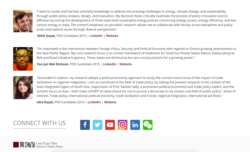For years, Singapore has won trust among Western countries while keeping on good terms with the Chinese government.
Today the island nation is closely following the case of one of its citizens caught spying for China in the United States. The arrest has fueled concerns over China asking Singaporeans to help with intelligence-gathering.
Jun Wei Yeo admitted guilt in a U.S. court last week to acting as an illegal agent of Chinese intelligence. He will be sentenced in October and faces up to 10 years in prison.
Yeo is a 39-year-old academic who also uses the name Dickson Yeo. Singapore’s home ministry said in a brief statement that it had known of Yeo’s case since his arrest by U.S. officials in November. The ministry confirmed he is receiving assistance from Singaporean diplomats in the United States.
Court documents show Yeo became a spy for the Chinese four years earlier while attending a meeting in Beijing. He went there to give a presentation on Southeast Asian politics. Yeo moved to the United States in January of 2019.
“One fool like this can get all Singaporeans suspected,” said Bilahari Kausikan, an academic and former Singaporean diplomat.
At first, the Chinese told Yeo he was representing Chinese-based research centers. They offered to pay him for political reports and other information. He later learned some of his contacts were from Chinese intelligence agents.
Told to find people with non-public information about politics, economics, and diplomacy, Yeo first targeted Southeast Asia, before turning to the United States.
When he moved to the U.S. last year, the Chinese gave him a bank card and told him to communicate with them on several phones to avoid being caught.
Using the business networking website LinkedIn, Yao reached out to people who had financial or work problems. He paid them to write reports. Among those he persuaded to give up information was a civilian with high level security clearance working on a U.S. military program.
Yeo’s former professor at Singapore’s Lee Kuan Yew School of Public Policy was an ethnic Chinese U.S. citizen. In 2017, Singaporean officials accused that man, Huang Jing, of being a spy for an unnamed country.
Huang denied the accusations. He was never found guilty but was forced to leave Singapore.
Now working in Beijing, Huang said he was shocked and pleased that Yeo had been caught. He said Yeo had a “sense of insecurity and hunger for being somebody.”
Asia’s Switzerland
The home ministry said investigations into Yeo had not found “any direct threat” to Singapore. He may have not betrayed his own country. But he was caught spying against the United States, the superpower with whom Singapore has closes security ties.
China denied knowing anything about Yeo’s case. It accused the United States of using the spying charges to hurt China.
Relations between the two countries hit a new low during the past week. The United States closed China’s consulate in Houston, and China then seized the U.S. consulate in Chengdu.
Yeo’s case raised concerns among Western researchers that Singapore was an easy place for China to find spies. Well-educated ethnic Chinese people have passports that enable them to travel almost everywhere.
“People might be more suspicious of Singaporeans if there is a perception that Singapore is compromised,” said Chong Ja Ian. He is a visiting Singapore scholar at the Harvard-Yenching Institute in Cambridge, Massachusetts.
Singapore is often described as the Switzerland of Asia because of its wealth, international financial system and neutrality. It is one of the most politically stable countries in an area where the United States and China have competing interests.
China is Singapore’s biggest trading partner, as it is for many countries in Asia.
The Jamestown Foundation, a U.S.-based research center, said that China used business groups and other organizations in Singapore to spread misinformation about China. Nearly 75 percent of the island nation’s citizens are ethnic Chinese.
Bilveer Singh is with the National University of Singapore. He says the small nations’ openness and location has made it a base for many countries' spies.
Yeo was “definitely not an isolated case,” he said.
I’m Mario Ritter Jr.
The Reuters News Agency reported this story. Susan Shand adapted it for Learning English. George Grow was the editor.
_______________________________________________________________
Words in This Story
academic –adj. related to schools or educaton
card –n. a rectangular piece of plastic used for financial transactions
networking –n. the process of developing business and personal relationships
clearance –n. official permission to deal with often sensitive materials
consulate –n. diplomatic offices of a country where a consul is based
perception –n. a certain way of seeing something or someone
stable –adj. not easily changed or influenced
location –n. a place where something is or operates
isolated –adj. apart from others, far away






